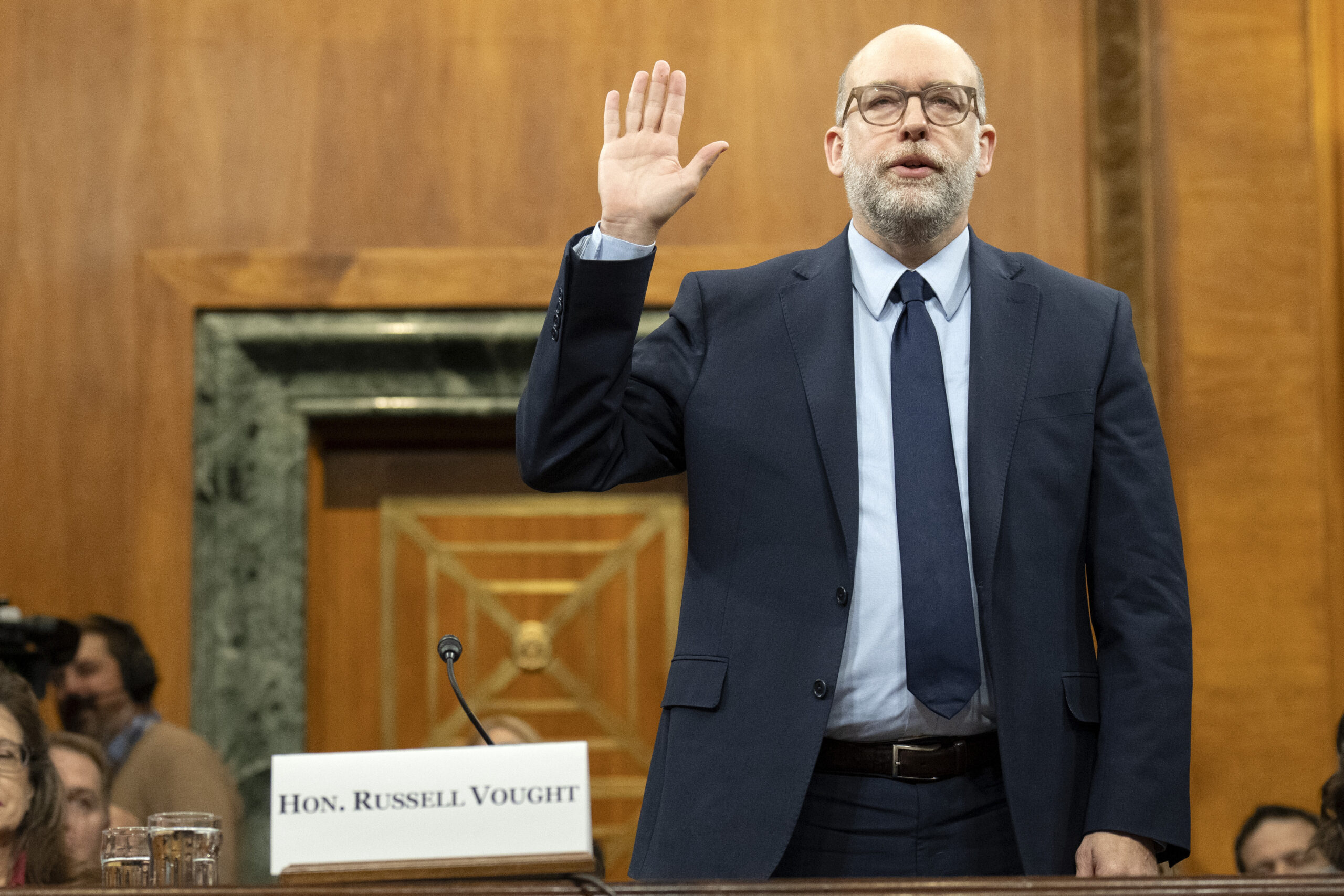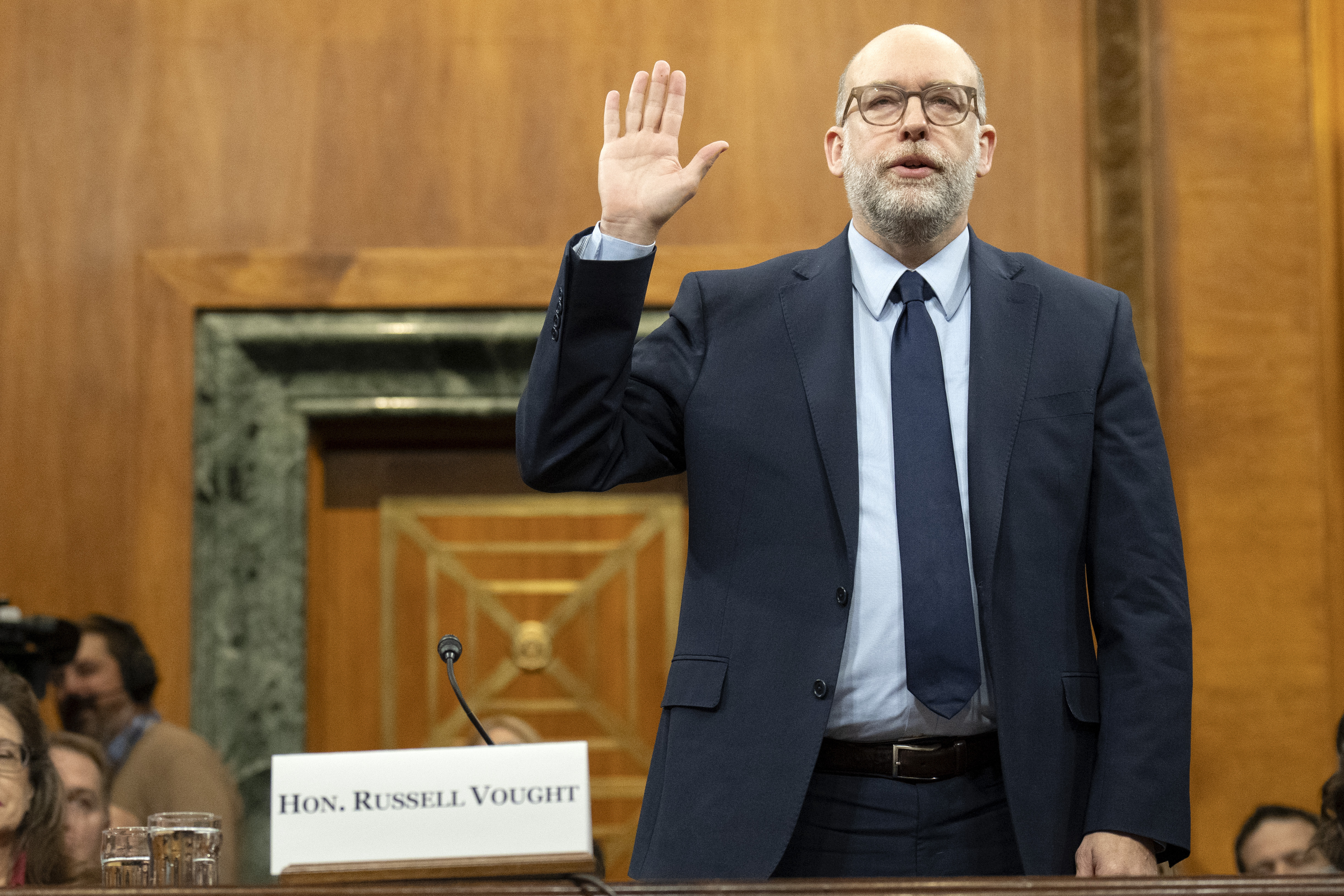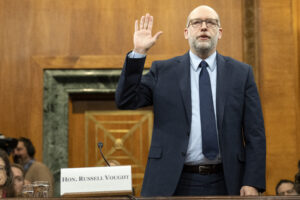Congress
On eve of House GOP leadership vote, Johnson shares opposition to punitive rules change
On the eve of the House GOP’s leadership elections, Speaker Mike Johnson is making clear he does not back new internal GOP rules proposals that would take punitive measures against Republicans who prevent GOP bills from coming to the floor.
“I have made clear to members, as I’ve been having discussion with them, that I am not in favor of punitive measures and rules. I think that we are going to work together as a cohesive team. It’s a brand new time, a brand new day,” Johnson exclusively told Blue Light News. “I don’t think we will have a need for party discipline and I expect everybody to be working on singing from the same sheet of music.”
His remarks come as Johnson, according to two sources, had privately told various members that he didn’t support punitive measures. Blue Light News first reported over the weekend that centrists had filed an amendment to the rules to allow for members who voted against bringing GOP policies to the floor be removed from committees.
But some conservatives worry that even if Johnson doesn’t support it, a majority of his GOP conference will move to punish conservatives who block him from bringing bills to the floor, which became common practice last term. Republicans will meet on Thursday to vote on internal rules for the next Congress.
One GOP member, who was granted anonymity to speak frankly, added that leadership just “wants to just calm these waters and move forward,” but supporters of the rules proposal might be able to get “a majority to vote on Thursday … a certain way. We’ve got to address that.”
Another conservative put it this way: “If Johnson is going to try to change the rules and go backwards — I think that is where the motivation is coming from to mount an effort against him. … If he made a public commitment that he is not going to [punish members] or not going to change the motion to vacate, I think that it’ll be a slam dunk for him.”
Johnson’s remarks come as Republicans say he isn’t sweating a potential challenger from conservatives, despite some members saying they reserve the right to put one forward. Part of the reason hardliners are leaning toward mounting a challenge against Johnson is to attempt to push him rightwards on House rules.
Others are hoping that while they point the finger at Republicans being united while Democrats are in chaos, they will be able to avoid similar charges directed at them if a challenger emerges.
“Many of us would like to see Mike not having a challenge, but rather recognizing that he’s the only candidate,” said Rep. Darrell Issa (R-Calif.), noting that former Speaker Kevin McCarthy faced a similar challenger from the right who only got about 30 votes. “Now the question is, why put up a candidate symbolically to be humiliated by getting a handful of votes.”
“There’s nobody you could put up that could propose anything more conservative,” he added.
The conservatives who want to see a challenger have so far failed to name who that member may be, but the group is expected to meet Tuesday night to discuss their plans.
“May or may not happen,” Rep. Eli Crane (R-Ariz.), a House Freedom Caucus member, said of a potential challenger. “Honestly, I don’t know that they will.”
Another member involved in the talks added that: “We’re reserving the right to have an alternative. I think we probably will.”
Johnson also said he expects Trump to endorse him Wednesday, before Republicans gather to vote by secret ballot about who will serve in their leadership lineup.
“He’s been talking very publicly everywhere about this, so I expect he’ll do it again tomorrow,” Johnson added.
Congress
Fetterman says he’ll oppose Gabbard, RFK Jr.
Sen. John Fetterman (D-Pa.), who has been willing to buck his party to confirm some of President Donald Trump’s Cabinet picks, is ruling out voting for two of the president’s most controversial nominees: Tulsi Gabbard and Robert F. Kennedy Jr.
Fetterman said in a post on X Thursday night that he won’t vote to confirm Gabbard as director of national intelligence or Kennedy as secretary of the Department of Health and Human Services. Both are now expected to be confirmed after their nominations had been seen to be in jeopardy.
“I have met with most of the cabinet nominees and have carefully watched their confirmation hearings,” Fetterman wrote. “After considering what’s at stake, I have voted against moving forward to the confirmation of Ms. Gabbard and Mr. Kennedy, and will be voting NO on their confirmations.”
Fetterman was the lone Democrat to vote to confirm Pam Bondi as Trump’s attorney general, was one of two Democrats to vote to confirm Scott Turner as Secretary of Housing and Urban Development and was the sole Democrat to cast a committee vote advancing billionaire Howard Lutnick’s nomination to lead the Commerce Department.
A potential 2028 presidential candidate, Fetterman met with Donald Trump earlier this year and has sought to differentiate himself from the Democratic party brand after a bruising election.
Congress
Russ Vought confirmed as White House budget chief

The Senate has confirmed President Donald Trump’s pick to lead the White House budget office despite Democrats delivering a marathon of speeches condemning the administration’s vision for slashing the federal government.
Lawmakers voted 53-47 Thursday evening to return Russ Vought for a second tour as director of the Office of Management and Budget. Republicans were in lockstep behind the man who could dramatically alter how federal dollars get spent, in part by taking the “power of the purse” away from members of Congress.
Democrats all voted against Vought, but it wasn’t enough. It had been clear for days that the GOP majority was united behind Trump’s pick for OMB director, even as the agency rocked Congress last week with an attempt to freeze congressionally approved funds.
But even with Vought’s path to confirmation clear, Democrats were under pressure from their party base to push back against Trump and his nominees in any way they could. While they couldn’t prevent the inevitable, they at least could slow it down by refusing to yield back 30 hours in procedural time that would have otherwise allowed for a more expedient vote.
They ultimately slow-walked proceedings up until the very end. As each Democratic senator cast their vote, they stood by their desk in the chamber and named a program or project in their state that may be impacted by OMB’s attempted freeze of federal funds.
It was the culmination of their first such protest of the second Trump administration. The previous afternoon, Democrats launched what became an all-nighter, providing programming on the Senate floor into the early hours of Thursday morning and throughout the day.
“Why doesn’t government run like a business?” asked Sen. Brian Schatz (D-Hawaii) in one floor speech. “Let me tell you why: because if you ran government like a business, you would shut down every rural hospital.”
Schatz, who was referring to a mantra of conservative budget hawks and the tech billionaire Elon Musk who has gained massive influence over executive branch decision-making, took multiple shifts on the floor over a 30-hour period — sometimes solo, sometimes in a buddy-act with Sen. Chris Murphy (D-Conn.). Senate Minority Leader Chuck Schumer (D-N.Y.) was also a frequent presence.

This was not a real talking filibuster, where one lawmaker must hold the floor for hours without rest in order to grind proceedings to a total halt. This 30-hour time clock would have expired whether or not anyone gave speeches.
But Democrats’ commitment to filling the time with anti-Vought rhetoric — not reading children’s books or other off-topic bloviating — was their attempt to amplify a message they have sustained since last year’s campaigns: that the Heritage Foundation’s Project 2025 blueprint for Trump’s second term is a dangerous threat to democracy.
Vought authored a chapter on the “Executive Office of the President” in the Project 2025 document.
“Russell Vought and Donald Trump think they may be above the law,” Sen. Richard Blumenthal (D-Conn.) said Wednesday during his speaking turn.
Even before their speech-a-thon, Democrats made two attempts at the committee level to show how serious they were about their disapproval of Vought. Senate Homeland Security and Governmental Affairs Committee Democrats voted against him in committee on Inauguration Day. Senate Budget Committee Democrats later boycotted their panel’s vote on the nomination.
Senate Democrats also held multiple news conferences to call out the high stakes of Vought’s confirmation.
“I wish they had the strength, damn it, to vote him down. And I know the Senate was up all night,” Rep. Rosa DeLauro, the top Democrat on the House Appropriations Committee, said of Republicans in an interview on Thursday. “Russ Vought does not belong in public service. He really should be thrown out. He is a dangerous person to our government.”
Sen. Susan Collins (R-Maine), the chair of the Senate Appropriations Committee, said Wednesday she would be “concerned if the Trump administration is clawing back money that has been specifically appropriated for a particular purpose.”
But she, too, voted Thursday to confirm Vought. So did Sen. Rand Paul (R-Ky.), the chair of the Homeland Security and Governmental Affairs Committee who is deeply sensitive to perceptions of executive branch meddling in congressional business, including spending.
Overwhelmingly, Republicans on both sides of the Capitol have been enthusiastic about Vought’s rise to power, believing he’ll bring a heavy hand to spending cuts across the federal government.
“There’s no better mind for rooting out all of the nonsense,” Rep. Chip Roy (R-Texas) said in an interview this week. “And he’ll be working side by side with the DOGE guys and figuring out what we need to do to actually deliver.”
Vought’s installation follows two weeks of turbulence spurred by OMB’s move — under an acting director — to freeze congressionally approved spending, followed by a U-turn rescinding a key memo ordering the freeze.
Among his most controversial ideas is that the Impoundment Control Act, enacted more than 50 years ago to insulate the congressional appropriations process from intervention from the executive branch, is unconstitutional and the president should have more unilateral powers to cut spending.
The Senate’s confirmation of Vought could embolden the White House as the administration seeks to shirk that law, which requires the president to ask Congress to rescind or hold spending it has already approved.
Vought also has a history of holding back federal dollars approved by Congress, including the freezing of Ukraine aid during Trump’s first presidency — an episode that fueled Trump’s first impeachment in 2019.
“The president ran on the notion that the Impoundment Control Act is unconstitutional,” Vought told lawmakers in his confirmation hearing last month before the Budget Committee. “I agree with that.”
Jennifer Scholtes and Meredith Lee Hill contributed to this report.
Congress
More Dems join with Republicans to pass fentanyl crackdown bill
The Republican-led House passed legislation Thursday with significant Democratic support that would lead to harsher sentences for fentanyl traffickers, leaving it with a good chance of becoming law.
The so-called HALT Fentanyl Act got more Democrats on board this year, with 98 voting in favor, compared with the 74 Democrats who backed a similar version when it passed the House last Congress. The bill didn’t receive a Senate vote at that time amid Democratic concerns it leaned too heavily on law enforcement and would result in more mass incarcerations — a worry for some Democrats this time around too.
But now, with Republicans controlling the Senate and enough Democratic co-sponsors in that chamber to clear the filibuster threshold, the bill has a strong chance of being enacted. It sailed through the House with a 312-108 vote.
The swift passage in the House so early in the new year underscores that Republicans see responding to the opioid epidemic as both a top policy priority and a political messaging winner, framing the issue in the context of calls to bolster border security and arguing Democrats haven’t done enough to stop it.
At the same time, the growing bipartisan support for the legislation signals a growing willingness among Democrats to lean into law enforcement after a bruising election loss that left them out of power in Washington.
The measure would permanently classify street versions of fentanyl, the killer synthetic opioid, as Schedule I substances, in recognition of the seriousness of the product’s addictive and deadly qualities. It also would bolster efforts to research fentanyl analogs.
Fentanyl-related substances are currently considered a Schedule I substance on a temporary basis until March 31, putting pressure on lawmakers to act quickly to make that designation permanent. Fentanyl itself, which has medicinal uses, is a Schedule II drug.
Supporters of the legislation have argued it would give law enforcement more power to crack down on drug traffickers, since it would result in harsher sentences for fentanyl traffickers. Many Democrats, in addition to their concerns that the bill will exacerbate inequities in the criminal justice system, are calling for an approach that puts more of an emphasis on public health.
“Rescheduling fentanyl as a Schedule I substance in and of itself does not prevent one death,” said Rep. Diana DeGette of Colorado, the top Democrat on the House Energy and Commerce Committee’s health subcommittee, said at a Rules Committee hearing this week. “The HALT Fentanyl Act does nothing to provide law enforcement or public health agencies with additional resources to detect and intercept illicit drugs at legal ports of entry, nor does it provide resources for prevention, treatment or recovery efforts.”
Rep. Morgan Griffith (R-Va.), a senior member of the Energy and Commerce Committee and the bill’s sponsor, has said the HALT Fentanyl Act is just one part of a broader approach needed to take on the opioid crisis, including tariffs on imports from China, which provides many of the chemicals used to produce fentanyl.
Democrats also expressed frustration during floor debate with a Trump administration federal funding freeze that has thrown health care providers into chaos.
“There are still real concerns about federal funding not getting out the door to help us combat the drug overdose epidemic,” Energy and Commerce Committee ranking member Frank Pallone (D-N.J.) said.
-

 The Josh Fourrier Show3 months ago
The Josh Fourrier Show3 months agoDOOMSDAY: Trump won, now what?
-
Economy3 months ago
Fed moves to protect weakening job market with bold rate cut
-
Economy3 months ago
Harris dismisses Trump as ‘not serious’ on the economy in BLN interview
-
Economy3 months ago
It’s still the economy: What TV ads tell us about each campaign’s closing message
-
Politics3 months ago
Donald Trump wants Americans to hate Kamala Harris — but he’s failing
-

 Politics3 months ago
Politics3 months agoHow Republicans could foil Harris’ Supreme Court plans if she’s elected
-

 Politics3 months ago
Politics3 months agoDemocrats express concern over Gaetz pick
-
Economy3 months ago
Biden touts economic gains, acknowledges a long way to go




